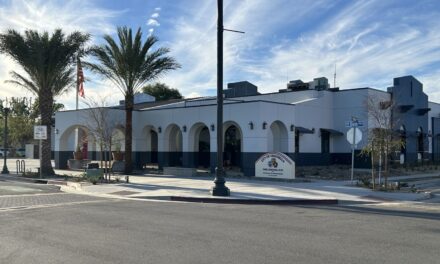‘I have demonstrated my ability to turn things around once at College of the Desert and I can do it again.’ — Joel Kinnamon
RANCHO MIRAGE — Former COD Superintendent/President Joel Kinnamon is challenging incumbent Aurora Wilson to represent Trustee Area 4, which includes Rancho Mirage, most of Palm Desert and Indian Wells. Wilson has served on the board since 2013.
UR: Who, or what, motivated you to run for a seat on the Board of Trustees?
Joel Kinnamon: I have had several members of the community, faculty, staff and administrators ask me to consider running for Desert Community College District Trustee Area 4. Initially, I was not interested but shared the mutual concerns that were being expressed to me. It is very unusual for a college to transition so negatively in such a short period of time. When I was there the college earned a stellar and nationally recognized reputation.
However, the result of the majority of the Board of Trustees with limited experience and not acting within their proper roles as outlined by the Western Association of Schools and Colleges Accreditation Standards (Adopted June 2014) and their disregard of the intent of Assembly Bill 1725 (Shared Governance) have demonstrated the Board has lost the public and employee trust.
The college faced many challenges when I was hired as Superintendent/President in 2012. However, having served in community colleges for several decades I knew working collaboratively the college would overcome and prosper. We accomplished that with excellence in serving our students and communities.
I am the only candidate that has extensive experience and understanding of the role of a Trustee. I also currently serve as the Chair of the Board of Trustees for the California Indian Nations College. In addition, I have demonstrated my ability to turn things around once at College of the Desert and I can do it again. Listed below are several items related to accreditation of our public community colleges:
*Standard IV: Leadership and Governance 16
3. The governing board adheres to a clearly defined policy for selecting and evaluating the CEO of the college and/or the district/system.
4. The governing board is an independent, policy-making body that reflects the public interest in the institution’s educational quality. It advocates for and defends the institution and protects it from undue influence or political pressure. (ER 7)
5. The governing board establishes policies consistent with the college/district/system mission to ensure the quality, integrity, and improvement of student learning programs and services and the resources necessary to support them. The governing board has ultimate responsibility for educational quality, legal matters, and financial integrity and stability.
6. The institution or the governing board publishes the board bylaws and policies specifying the board’s size, duties, responsibilities, structure, and operating procedures.
7. The governing board acts in a manner consistent with its policies and bylaws. The board regularly assesses its policies and bylaws for their effectiveness in fulfilling the college/district/system mission and revises them as necessary.
8. To ensure the institution is accomplishing its goals for student success, the governing board regularly reviews key indicators of student learning and achievement and institutional plans for improving academic quality. 9. The governing board has an ongoing training program for board development, including new member orientation. It has a mechanism for providing for continuity of board membership and staggered terms of office.
10. Board policies and/or bylaws clearly establish a process for board evaluation. The evaluation assesses the board’s effectiveness in promoting and sustaining academic quality and institutional effectiveness. The governing board regularly evaluates its practices and performance, including full participation in board training, and makes public the results. The results are used to improve board performance, academic quality, and institutional effectiveness.
11. The governing board upholds a code of ethics and conflict of interest policy, and individual board members adhere to the code. The board has a clearly defined policy for dealing with behavior that violates its code and implements it when necessary. A majority of the board members have no employment, family, ownership, or other personal financial interest in the institution. Board member interests are disclosed and do not interfere with the impartiality of governing body members or outweigh the greater duty to secure and ensure the academic and fiscal integrity of the institution. (ER 7)
12. The governing board delegates full responsibility and authority to the CEO to implement and administer board policies without board interference and holds the CEO accountable for the operation of the district/system or college, respectively. Standard IV: Leadership and Governance 17
13. The governing board is informed about the Eligibility Requirements, the Accreditation Standards, Commission policies, accreditation processes, and the college’s accredited status, and supports through policy the college’s efforts to improve and excel. The board participates in evaluation of governing board roles and functions in the accreditation process.
UR: What qualifications specifically do you bring to the board?
Joel Kinnamon: I have 30 years of experience in community colleges and have spent 9 years (2012-2021) as the Superintendent/President that reported to the Board of Trustees that I am seeking to be elected. In addition, I have a Doctor of Education and a Master of Business Administration and extensive professional development regarding community colleges. However, one of my greatest qualifications is seeking out professional expertise to assist me when needed.
Under my leadership, the college community were successful in fulfilling the dreams of thousands of students and community members. We offered free tuition to all high school graduates from the Coachella Valley, free public transportation, and we became nationally recognized for academic excellence and as a “public institution to serve the community”.
If you recall, upon my arrival in 2012 we owed the State of California approximately $8 million due to overreporting of full-time equivalent students. There were so many headlines similar to what exists today. However, together we pushed through those situations and became a college that other colleges wanted to become. Upon my retirement we were fiscally sound with more than a $30 million reserve, expanded program offerings and exceptional new faculty and staff. The college became a state and national model. Most importantly, we focused on students, community, and followed (and created) model processes.
We were the fastest growing community college in the State of California and made our primary focus to be humanistic in our approach while utilizing transparent processes for decision making. In addition, having served on approximately twelve (12) California community college accreditation teams, many as the chair, I have the expertise in understanding the role of the Governing Board of Trustees.
UR: What specifically makes you a better candidate than your opponent?
Joel Kinnamon: The incumbents clearly have lost the public trust on so many fronts and have struggled with multiple messaging to recover. The public has caught individual trustees including the Trustee in Area 4 in everchanging stories that are inconsistent, unreliable and deceitful. The public record (votes on board items, public comments, documents created by consultants…) clearly sheds light on this when you look at the timeline, meeting minutes and media records.
I am the better candidate because of my knowledge of the appropriate roles of Trustees. A strong proven background on how to garner support through transparent and inclusive processes. A record of being open and honest with all constituents both in good and bad situations.
I will not be a Trustee that has allegations made due to unnecessary actions or statements made by whistleblowers and lawsuits. Recently, the board hired a consultant to assist in a strategic plan. The consultant shared “portions” of the plan at a public meeting in recent weeks. Unfortunately, the public only was provided a portion of the PowerPoint to the public (even though the PowerPoint included additional slides). How do you ever regain the public trust if you continue with this type of practice. This is an example of holding information that is damaging (I can only assume because of its content and the upcoming election). Included with my materials is the presentation and when reading the Strengths, Weaknesses, Opportunities and Threats (SWOT) you will see they found the No. 1 weakness to be the Governing Board.
I will not be a Trustee that condones serial meetings, Brown Act violations, or withholding public records requests for months only to promise them after the election. Since my retirement I am contacted daily by employees and community members that are alarmed at what they are witnessing. The employees indicate it is just the “tip of the iceberg.” What I promise is to bring external forensic auditors and independent investigators to determine what has occurred and how we can pursue a course of action focused on STUDENTS and COMMUNITY.
UR: How much do you plan to spend on your campaign?
Joel Kinnamon: We are estimating between $160,000 to $200,000.
UR: Your campaigns are reportedly the most expensive races in the college’s 64-year history, and campaign finance reports support that. Why so much? Are you trying to buy a seat?
Joel Kinnamon: It is very expensive to run a campaign that serves such a vast area with approximately 155 precincts. In addition, our local community understands how critical this seat is and there has been an outcry that the college is not meeting their expectations. This makes the race even more important requiring you expend sufficient resources to get your message out to the electorate. There are so many races on the ballot and candidates that compete for the various modalities and that also impacts costs.
I am trying to get my message out and let people know that we can get things back on track with my proven experience. I trust they believe I am the only viable candidate after what they have seen my incumbent do over the past eighteen months.
UR: A prominent and well-educated Coachella Valley resident won’t discuss this race on the record because he said it is such a “tangled web.” How on earth did College of the Desert get to this point with stories of lawsuits to get public records and more.
Joel Kinnamon: I believe we got here because politicians took control of the Board of Trustees for their own political and personal interest. The facts will eventually come out when individuals feel they can go on the record without retribution. Public Education should not ever be used as a political device for individual politicians.
UR: What will you specifically do to lower the temperature and get COD moving forward? You are only one member of the board?
Joel Kinnamon: We need additional professional development for all members of the Board of Trustees.
We need to get politics and politicians out of influencing the decisions of our public educational system and allow the professionals to do their jobs.
We need to thoroughly review what has occurred with forensic audits and oversight agencies and appropriately respond to any findings.
It is critical that the focus of the board needs to (be) the overall mission rather than solely on facilities.
If the board will fulfill its proper role and individual board members, they will return to functioning effectively and service as a governance and policy board.
Develop policies that have higher thresholds for the college in making major changes that impact the communities. This would include a requirement of several public hearings coordinated by mutually agreeable third-party facilitators.
Lastly, we will fulfill commitments that remain unfulfilled and that were part of the Facilities master plan.
UR: What additional campuses/programs need to be built, where and why?
Joel Kinnamon: In 2007, it was determined that the district would have two primary campuses. The process included “blue ribbon” committees determining that in addition to the Palm Desert Campus there would be a campus in the East Valley and on in the West Valley. Measure B was passed and through the facilities master planning process buildings were prioritized. Initially, the Mecca/Thermal campus was to be a primary campus. However, the developers that donated the property did not develop the surrounding area. It was then determined the East Valley primary campus would be in Indio. During my tenure we determined the initial phase was inadequate and after passing Measure CC there were additional funds to double the size in the facility and add a Child Development Center.
The third primary campus was planned in West valley at the Tramview property acquired by the City and given to the college as an educational site. This location was re-evaluated after partners needed to support the campus determined they would not move forward. It became clear another site was needed so the college worked with the city and since funding was now available with the passage of Measure CC it was determined to move to the original blue-ribbon committees preferred site across the street from the High School and on a major transit hub. The West Valley currently does not have a college campus as promised in 2007. Students therefore do not have access to classes and contributes to highlight why the college-going rate from high schools in the west valley are significantly lower than the college-going rate in the East valley. This commitment needs to be fulfilled.
There are many other projects that are on file with the State Chancellor’s Office that need to be completed. In addition, as the demographics are reviewed, and the facility master plan updated additional instructional sites may be needed. Often these sites are in collaboration with partnerships and within other public agencies or existing educational facilities. However, at this time we are not filling the classes in either the Coachella library (this fall in there were six classes offered, two full with four still having opening) and at the Mecca/Thermal campus there are 10 classrooms with only 2 classes being offered (one a day Monday through Thursday).
UR: In 2019, the College conferred more than 1,576 degrees and certificates, a 50% increase over the previous four years. With all the negative press and headlines, the infighting, lawsuits, and the ugliness of this campaign, is the image of the College being tarnished? What will you do to ensure it’s not and/or how will you help repair it?
Joel Kinnamon: Yes, it is tarnished. However, as I indicated that was the case in 2012. We will have to go back to the same recipe through open, honest, transparent and inclusive dialogue. The college is a great gem to the valley – however, when politicians internal/external to the college begin impacting the decision-making process of the institution it is a recipe for disaster. That is why it is critical to get back on track or things will get more difficult as time goes on.
UR: This is an important race, as you know. What would you like to add that we perhaps did not ask. (Note: This is not the time or place to thank supporters or urge residents to vote for you.)
Joel Kinnamon: How much more can the community, students and the college withstand if the incumbents are re-elected for four more years? Will that impact the status of the college’s accreditation?
Image Sources
- Joel Kinnamon: Joel Kinnamon







